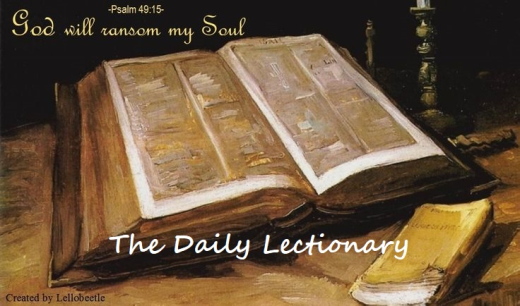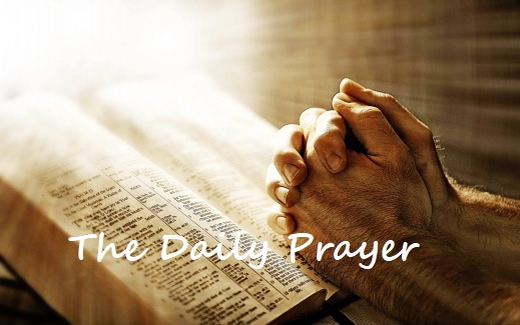 |
| Psalm 119:105-112; 2 Kings 22:3-20; Romans 11:2-10 |
The Daily Lectionary
MONDAY, February 10, 2020
(Revised Common Lectionary Year A)
The law is light
105 Your word is a lamp for my feet,
a light on my path.
106 I have taken an oath and confirmed it,
that I will follow your righteous laws.
107 I have suffered much;
preserve my life, Lord, according to your word.
108 Accept, Lord, the willing praise of my mouth,
and teach me your laws.
109 Though I constantly take my life in my hands,
I will not forget your law.
110 The wicked have set a snare for me,
but I have not strayed from your precepts.
111 Your statutes are my heritage forever;
they are the joy of my heart.
112 My heart is set on keeping your decrees
to the very end.
Huldah urges Josiah to keep the law
22:3 In the eighteenth year of his reign, King Josiah sent the secretary, Shaphan son of Azaliah, the son of Meshullam, to the temple of the Lord. He said: 4 “Go up to Hilkiah the high priest and have him get ready the money that has been brought into the temple of the Lord, which the doorkeepers have collected from the people. 5 Have them entrust it to the men appointed to supervise the work on the temple. And have these men pay the workers who repair the temple of the Lord— 6 the carpenters, the builders and the masons. Also have them purchase timber and dressed stone to repair the temple. 7 But they need not account for the money entrusted to them, because they are honest in their dealings.”
8 Hilkiah the high priest said to Shaphan the secretary, “I have found the Book of the Law in the temple of the Lord.” He gave it to Shaphan, who read it. 9 Then Shaphan the secretary went to the king and reported to him: “Your officials have paid out the money that was in the temple of the Lord and have entrusted it to the workers and supervisors at the temple.” 10 Then Shaphan the secretary informed the king, “Hilkiah the priest has given me a book.” And Shaphan read from it in the presence of the king.
11 When the king heard the words of the Book of the Law, he tore his robes. 12 He gave these orders to Hilkiah the priest, Ahikam son of Shaphan, Akbor son of Micaiah, Shaphan the secretary and Asaiah the king’s attendant: 13 “Go and inquire of the Lord for me and for the people and for all Judah about what is written in this book that has been found. Great is the Lord’s anger that burns against us because those who have gone before us have not obeyed the words of this book; they have not acted in accordance with all that is written there concerning us.”
14 Hilkiah the priest, Ahikam, Akbor, Shaphan and Asaiah went to speak to the prophet Huldah, who was the wife of Shallum son of Tikvah, the son of Harhas, keeper of the wardrobe. She lived in Jerusalem, in the New Quarter.
15 She said to them, “This is what the Lord, the God of Israel, says: Tell the man who sent you to me, 16 ‘This is what the Lord says: I am going to bring disaster on this place and its people, according to everything written in the book the king of Judah has read. 17 Because they have forsaken me and burned incense to other gods and aroused my anger by all the idols their hands have made, my anger will burn against this place and will not be quenched.’ 18 Tell the king of Judah, who sent you to inquire of the Lord, ‘This is what the Lord, the God of Israel, says concerning the words you heard: 19 Because your heart was responsive and you humbled yourself before the Lord when you heard what I have spoken against this place and its people—that they would become a curse and be laid waste—and because you tore your robes and wept in my presence, I also have heard you, declares the Lord. 20 Therefore I will gather you to your ancestors, and you will be buried in peace. Your eyes will not see all the disaster I am going to bring on this place.’”
So they took her answer back to the king.
A remnant remains faithful
11:2 God did not reject his people, whom he foreknew. Don’t you know what Scripture says in the passage about Elijah—how he appealed to God against Israel: 3 “Lord, they have killed your prophets and torn down your altars; I am the only one left, and they are trying to kill me”? 4 And what was God’s answer to him? “I have reserved for myself seven thousand who have not bowed the knee to Baal.” 5 So too, at the present time there is a remnant chosen by grace. 6 And if by grace, then it cannot be based on works; if it were, grace would no longer be grace.
7 What then? What the people of Israel sought so earnestly they did not obtain. The elect among them did, but the others were hardened, 8 as it is written:
“God gave them a spirit of stupor,
eyes that could not see
and ears that could not hear,
to this very day.”
9 And David says:
“May their table become a snare and a trap,
a stumbling block and a retribution for them.
10 May their eyes be darkened so they cannot see,
and their backs be bent forever.”
Optional parts of the readings are set off in [square brackets.]
The Bible texts of the Old Testament, Epistle, and Gospel lessons are from The Holy Bible, New International Version®, NIV® Copyright ©1973, 1978, 1984, 2011 by Biblica, Inc.® Used by permission. All rights reserved worldwide.
The Daily Lectionary is a three-year cyclical lectionary. We are currently in Year A. Beginning with the first Sunday of Advent in 2020, we will be in Year B. The year which ended at Advent 2019 was Year C. These readings complement the Sunday and festival readings: Thursday through Saturday readings help prepare the reader for the Sunday ahead; Monday through Wednesday readings help the reader reflect and digest what they heard in worship. Revised Common Lectionary Daily Readings, copyright © 2005 Consultation on Common Texts. www.commontexts.org
The Daily Lectionary for MONDAY, February 10, 2020
Psalm 119:105-112; 2 Kings 22:3-20; Romans 11:2-10








